PtX.Training
Renewable Power-to-X Basic Training
The Renewable Power-to-X Basic Training provides an extensive overview on principles and practical aspects of Power-to-X (PtX). It covers crucial issues such as PtX technologies, production processes, economics and infrastructure, sustainability and policies.
This training is available for political stakeholders (module developed by PtXHub) as well as for project practitioners (module developed by H2Uppp with Fraunhofer)
Add-on Modules
The Renewable Power-to-X Add-On Modules provide an in-depth immersion into different application industries and issues regarding Power-to-X (PtX). Currently, our modules cover the topics: Aviation • Shipping • Power-to-Chemicals • Certification of PtX products • PtX project finance • PtX CBAM • Safety • Green steel • Green ammonia and e-fertiliser
Renewable Power-to-X Basic Training
After an introduction to the topic of renewable PtX, the training dives deeper into production pathways, and evaluates its various downstream products such as green ammonia and methanol. For PtX truly being renewable, the concept of sustainable carbon is essential – which is why this is a crucial part of the course. The training also looks into the economics of renewable energy and PtX, including cost development of electrolysers and its main drivers, green hydrogen and PtX derivates.
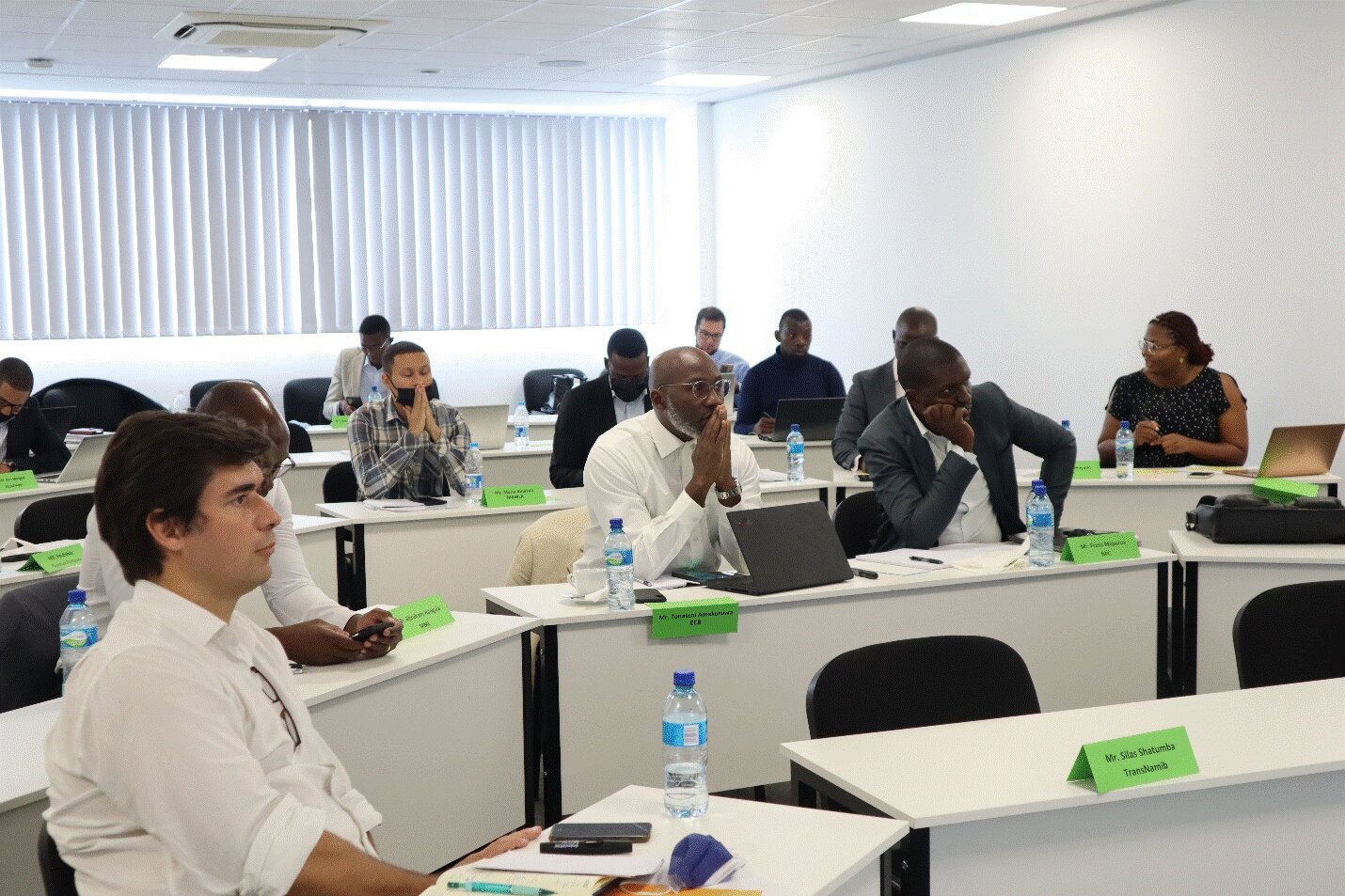
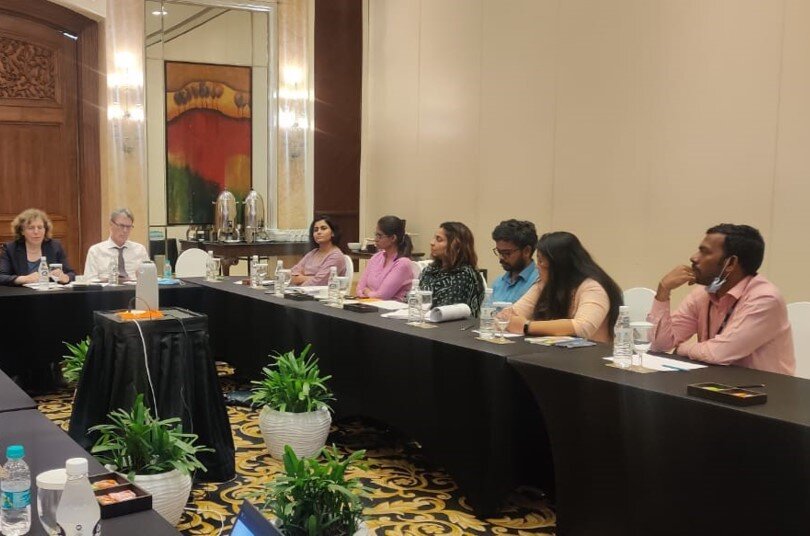
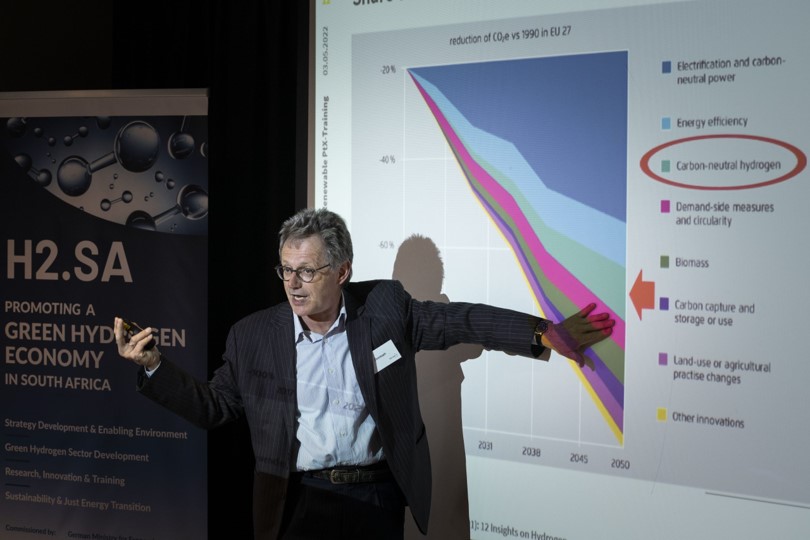
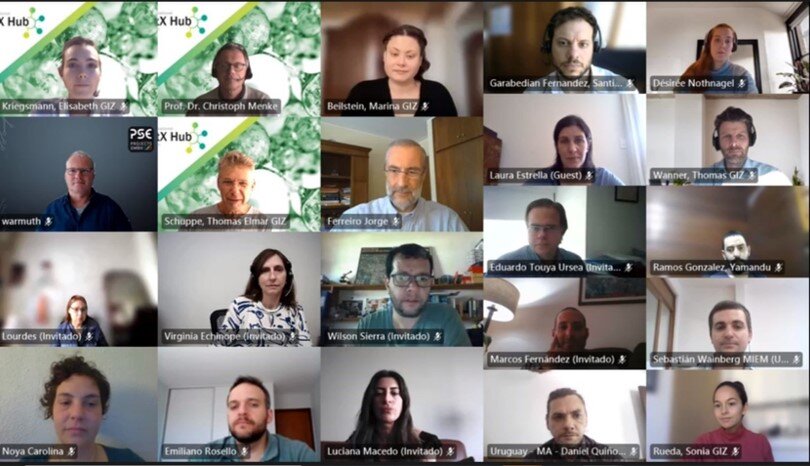
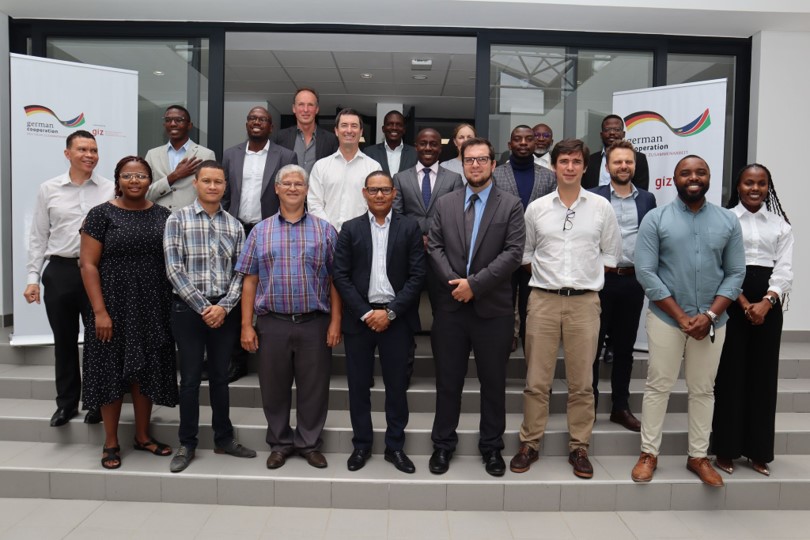
Furthermore, participants are invited to go on field trips to study PtX technology in live application, e.g. visiting interesting companies, production sits or hydrogen labs.
The fourth part of the training addresses techno-economic criteria of the relevant infrastructure for the transportation, storage, and trade of renewable PtX products. Equipped with these insights, participants then look into sector-specific PtX demand markets and value chains, pathways and business cases.
Sustainability considerations frame and guide all PtX endeavours to assure a just development of the industry in line with climate and environmental protection in the region where it develops. This is why the EESG Framework (Economic, Environmental, Social, Governance) serves as the conceptual framework to understand sustainability aspects in all dimensions to ensure that future PtX industries will contribute to sustainable development. The participants leave the training with profound insights and food-for-thought, an inspirational selection of best practices of political institutional frameworks, strategies, instruments, and regulations, which have already been introduced.
We are convinced that humankind can maintain and expand its prosperity without fossil fuels. PtX can be one – of many – building blocks of this new, climate-neutral world.
Completed trainings
Renewable Power-to-X Basic Training
Target audience
- Primarily decision-makers in energy, environmental, economic, infrastructural ministries
- Experts of regulatory authorities and other relevant administrations
- Experts in public and private research institutes, energy federations and renewable energy agencies
- Journalists and actors of civil society and
- Professionals in the private sector
Basic training outline (7 modules)
- Introduction
- Production pathways
- Economics
- Transport and storage infrastructure
- Markets
- Sustainability aspects
- Policies and regulations
Duration and format
- 3-day training: 6 hours of lecture on days 1 and 2, and an interactive, country-specific transfer workshop on day 3
- 2-day training: 4-6 hours of lecture per day, no transfer workshop
- Executive training: 1-2 hours of training for participants in executive roles
Any other format might be arranged upon request. Trainings can be offered fully virtual or onsite. Hybrid settings are also possible (i. e. participants group together in a venue and trainers hold lectures virtually).
Green Hydrogen and Power-to-X Basic Training for practitioners (H2Uppp)
Target audience
- Employees of companies with interest in production, trading and use green hydrogen and PtX
- Learners with basic knowledge of green hydrogen and PtX
Basic training outline (5 modules)
- Short basic introduction to green H2/PtX
- Basic techno-economics of H2/PtX technologies
- Technical projects design of H2/PtX plans including aspects of sustainability, certification, legal and commercial dimension
- All aspects will take national conditions into account
- Practical exercise with a technical and economic calculation / planning tool (excel) for a basic green hydrogen production plant
Duration and format
- 3-4 days + self-studies (preparation of project case)
The PtX training is much more than the transfer of knowledge from the trainer to the trainee. It is more like acquiring the knowledge and skills needed to look into the crystal ball of a green hydrogen industrial revolution. The training is impact-oriented, insightful, knowledgeable and captivating.
Dr. Lucy M. Ombaka
Participant in the Kenya PtX Training
2022


It was interesting learning with fully qualified trainers to understand how PtX enables the transformation of renewable energy into synthetic fuels and other chemicals to obtain end products like fertilisers and cosmetics.
Rocio Rodriguez
Participant in the Argentina PtX
Training 2021
Done from the synthetic fuel industry in South Africa and found the broad scope of the training important to understand the challenges facing the Power-to-X ambition. This is a good introduction for all stakeholders interested Power-to-X as it provides an understanding of the interplay between the many disciplines required to make a success of Power-to-X in South Africa.
Gareth Shaw
Participant in the South Africa PtX
Training 2022

Add-on Modules
Sustainability
This training provides in-depth knowledge of the content of the PtX.Sustainability Scoping Paper. Learners will understand the importance of sustainability criteria being considered on different levels, such as the production process, project planning and policies on country level. Along with four dimensions Environmental, Economic, Social, and Governance (EESG) and 16 thematic clusters, learners get to know a systematic approach to the topic of sustainable PtX.
Aviation
Sustainable Aviation Fuel (SAF) is the current strongest tool to defossilise the aviation sector and decrease emissions. The training presents this potential in a broader context, taking into account not only the production chain (feedstock availability and chemical processes) but also policy instruments, certification and practical plant construction issues. A particular focus on e-SAF is given. The link to overall sustainability concerns is established, with the goal to reflect on each country’s development potential with regard to SAF production.
Shipping
The shipping industry is aiming at net zero by 2050. Participants of this training will understand the current debates around sustainable shipping fuel technologies as well as challenges and opportunities of international policies for the domestic industry.
Power-to-Chemicals
Aiming at spreading the knowledge about renewable Power-to-X and its potential for the chemical industry, this training explores the potential applications for the chemical sector.
Certification of PtX products
Certification, standards, guidelines – certifying a product, a supply chain or industrial plants? In this add-on module training, we dive deeper for clarity on PtX related certifications. We start with the basics by differentiating between certification of industry/technical vs. sustainability aspects as well as certification as a legal requirement vs. voluntary certification. Participants will also learn about the EU certification set-up and receive an overview of global developments as well concrete examples of how certification works.
PtX project finance
This training module provides a comprehensive overview of the fundamentals of project finance and how to set it up for PtX projects. In its interdisciplinary approach, the training covers financial fundamentals, contractual requirements and the various financial and support instruments available, as well as the concept of blended finance. Key stakeholders like the investment industry, development finance institutions and involved ministries can get prepared to understand the unique risk structure of PtX project finance in this training.
PtX Carbon Border Adjustment Mechanism (CBAM)
This module covers the what, who, when and how of the European Union’s CBAM. Participants will learn how CBAM can be used to combat climate change through concrete policies to reduce greenhouse gas emissions, and understand how it will shape future trade relations between the EU and its partners, with a particular focus on hydrogen and other PtX products.
Safety
The safety training outlines the risks and hazards associated with key substances such as hydrogen, oxygen, ammonia, and methanol, while highlighting their specific properties and how these can lead to hazardous situations. At the end of the training participants will have a sound understanding of the risks and safety requirements for handling PtX substances. They will be equipped with the knowledge to implement essential safety measures and follow established protocols to minimise risks and ensure a safe operating environment.
Green steel
This training offers insights into the production of climate-neutral steel. Participants will gain the knowledge and expertise to understand the drivers behind the steel industry and will be given guidance on how to develop defossilisation strategies that include steelmaking.
Green ammonia and e-fertiliser
The training provides an understanding of the potential of Power-to-X for fertiliser production. Participants will develop an understanding of (mineral) fertilisers and their critical role in global food systems, focusing on the potential of green ammonia and e-fertiliser production, economics, global trade and policy frameworks driving the sector.
Interested? Contact:

Ruth Barbosa
I contribute to the concepts and didactics of our PtX trainings, some I have transferred into self-paced e-learnings. As PtX.Community coordinator, I welcome our alumni and other enthusiasts to stay in touch with us. I am also focal point for our Aviation activities, where I participate in the ongoing discussion on how to make flying more sustainable, e.g. through e-SAF and other innovative solutions. It is exciting to contribute to innovative solutions for our climate crisis. Training people is key to bring clean technologies into practice and scale. In particular, the Aviation sector is where the needed transition affects us all!
Focus
The development of knowledge products on Sustainable Aviation is what I currently focus on. Also, I create a continuous learning environment for our PtX.Community through regular updates and alumni meet-ups.
Mission
A believe our PtX trainings are just the beginning: with them we can contribute to set the agenda and offer tools for a sustainable future.